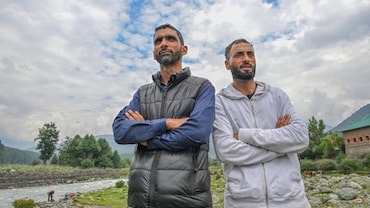- HOME
- /
- True Stories
- /
- Good News
- /
Good News: A Bright Idea For Cleaner Air, A Home Harvest For Food Supplies And Fighting Fire With Fungi
Inspiring stories from across the country that show how seemingly complex problems can have simple solutions
 14-year-old Vinisha Umashankar demonstrates her solar ironing cart, which won the 2020 Children’s Climate Prize. Photo credit: Children’s Climate Prize
14-year-old Vinisha Umashankar demonstrates her solar ironing cart, which won the 2020 Children’s Climate Prize. Photo credit: Children’s Climate Prize
Ironing carts are a fairly common sight in most neighbourhoods and the street in Tiruvannamalai, Tamil Nadu, where 14-year-old Vinisha Umashankar lives is no exception. As she watched the cart owner use charcoal to heat his heavy cast-iron box, the class nine student realized that the process was one that contributed heavily to both land and air pollution. She began researching a better way and came up with a solution in two months—an ironing cart with a solar-panelled roof that charges a 100 Ah battery to produce 250 watts of power in an hour. Five hours of sunshine can fully charge the battery, which powers the iron for six hours. It can also run a coin-operated PCO, and USB mobile charging points for added income.
With an estimated 10 million ironing carts in India burning a total of 50 million kgs of charcoal daily, Umashankar’s clean-energy innovation has the potential to transform a carbon-footprint-heavy industry, reduce the burden of pollution and save millions of trees. She received the Swedish Children’s Climate Prize in the clean air category this year for her brilliant idea.
Source: The Logical Indian
***
When 22-year-old Dubai-based Sijo Zachariah landed in Kerala to attend a family wedding earlier this year, the last thing he expected was a nationwide lockdown and travel ban. Even more worrisome was the thought of dwindling food supplies as stores remained shuttered and shop shelves went empty. “That’s when the whole thing struck me,” he tells Associated Press. “What’s going to happen? How are we going to feed ourselves?”
Interestingly enough, the solution was right there at home. Along with his father, a long-time gardening enthusiast, Zachariah collected seeds from whatever fruits and vegetables were available at the grocer’s and planted them on their family’s plot of land, which already had coconuts, jackfruit and rambutan growing there. Guided by YouTube videos and techniques his farmer grandfather passed down, the duo created a flourishing garden that provided food supplies to 20 neighbouring households during lockdown. They also taught interested community members to create their own home harvests.
The experience induced the aircraft maintenance engineer to switch careers to one more in line with what his grandfather once did—working the soil. “It’s a big change for me. But this is what makes me happy—helping others and being in nature,” he says.
Source: Associated Press
***
Stubble burning—a common farming practice where the remains of a summer harvest are burnt to prepare the fields for winter crops—has long led to plummeting air quality in the nation’s capital and surrounding states. However, a development five years in the making by the Indian Agricultural Research Institute (IARI) in Pusa, Delhi could allow residents to breathe easy. Instead of burning stubble, farmers are being offered the Pusa Decomposer capsule. Each capsule, containing seven species of fungi, is converted into a biochemical liquid and sprayed on stubble to decompose it in around 20 to 25 days.
 The Pusa Decomposer capsules. Photo: Pankaj Jain
The Pusa Decomposer capsules. Photo: Pankaj Jain
According to Dr Y. V. Singh, principal scientist, IARI division of microbiology, “The four capsules in a pouch can be used to make 25 litres of solution that can then be used on 2.5 acres of field. This will help in curbing the practice of crop burning and can be used in all forms on any farm.” Such a low-cost, sustainable solution that promises to improve air quality and enrich the soil in the long term may be just what the doctor ordered.
Source: India Today






